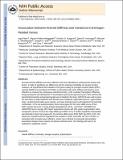Association between arterial stiffness and variations in estrogen-related genes
Author(s)
Peter, Inga; Kelley-Hedgepeth, Alyson; Huggins, Gordon S.; Mendelsohn, Michael E.; Vita, Joseph A.; Vasan, Ramachandran S.; Levy, Daniel; Benjamin, Emelia J.; Mitchell, Gary F.; Housman, David E; ... Show more Show less
DownloadHousman_Association between.pdf (344.0Kb)
OPEN_ACCESS_POLICY
Open Access Policy
Creative Commons Attribution-Noncommercial-Share Alike
Terms of use
Metadata
Show full item recordAbstract
Increased arterial stiffness and wave reflection have been identified as cardiovascular disease risk factors. In light of significant sex differences and the moderate heritability of vascular function measures, we hypothesized that variation in the genes coding for oestrogen receptors α (ESR1) and β (ESR2) and aromatase (CYP19A1) is associated with aortic stiffness and pressure wave reflection as measured by non-invasive arterial tonometry. In all, 1261 unrelated Framingham Offspring Study participants who attended the seventh examination cycle (mean age 62±10 years, 52% women) and had arterial tonometry and genotyping data were included in the study. Analysis of covariance was used to assess the association of polymorphisms with forward wave amplitude, augmented pressure, augmentation index (AI), carotid–femoral pulse wave velocity and mean arterial pressure with adjustment for potential confounders. In the sex-pooled analysis, those homozygous for the minor allele at any of four ESR1 variants that were in strong linkage disequilibrium ((TA)n, rs2077647, rs2234693 and rs9340799) had on an average 18% higher augmented pressure and 16% greater AI compared with carriers of one or two major alleles (P=0.0002–0.01). A similar magnitude of association was detected in those homozygous for the common allele at two ESR2 single-nucleotide polymorphisms (P=0.007–0.02). Our results are consistent with the hypothesis that variation in ESR1 and ESR2, but not CYP19A1, is associated with an increased wave reflection that may contribute to associations between these variants and adverse clinical events demonstrated earlier. Our findings will need to be replicated in additional cohorts.
Description
available in PMC 2010 April 1.
Date issued
2009-10Department
Massachusetts Institute of Technology. Department of Biology; Koch Institute for Integrative Cancer Research at MITJournal
Journal of Human Hypertension
Publisher
Nature Publishing Group
Citation
Peter, I et al. “Association Between Arterial Stiffness and Variations in Oestrogen-related Genes.” Journal of Human Hypertension 23.10 (2009): 636–644. Web.
Version: Author's final manuscript
ISSN
0950-9240
0950-9240